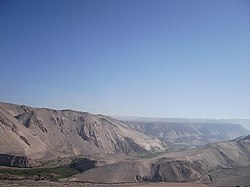geo.wikisort.org - River
The Lluta River is a river located in the northern portion of the Arica y Parinacota Region of Chile. Its headwaters are on the western flanks of the Andes of the Parinacota Province, just a few kilometers south of the border with Peru, and empties into the Pacific Ocean at the village of Villa Frontera, about 4 km north of the city of Arica.
Course
The Lluta originates at the confluence of the Quebrada Caracarani (which rises from the slopes of the Tacora volcano) and the Azufre River, at an elevation about 3,900 m asl. Along its first 36 km, the river flows southeast and then slowly begins to turn towards the west. In its descent to the lower elevations of the valley, the river starts to run through a canyon carved by the same river in rhyolite tuffs and other sediments scarcely joined.
In the vicinity of Socoroma, the river turns directly west and just past the canyon terminus, the river begins to widen. In Chironta, about 70 km from the sea, appear the first farms, whose foods are of a great importance for the consume of local people. Finally, the river empties into Pacific Ocean at an extensive beach, just a few kilometers north of Arica.
The hydrologic regime of the river basin is rain-dominated. The increase of its water volume occurs mainly in January and February, as a consequence of the phenomenon known as Bolivian Winter.
Under the Chilean proposal of 1975 to resolve the Atacama border dispute, the Lluta River would have become the northern border of Chile, and Bolivia would control the narrow strip between the river and the southern border of Peru.
Water quality
Apart from its problems of salinity and acidity, the river has very elevated levels of boron, arsenic, and sulfate, among other pollutants, which restricts the agricultural activities that can be developed along the river banks.[1] The river water is used only for irrigation of pastureland and crops which tolerate poor water quality, such as onions and potatoes.[1]
References
- "Lluta River, Chile". NASA Earth Observatory. 2 November 2013. Retrieved February 6, 2014.
- This article draws heavily on the corresponding article in the Spanish-language Wikipedia, accessed March 31, 2007.
- Niemeyer, Hans; Cereceda, Pilar (1983). Geografía de Chile — Tomo VIII: Hidrografía (1º edición, Santiago de Chile: Instituto Geográfico Militar ed.).
На других языках
[de] Río Lluta
Der Río Lluta ist ein Fluss in der Atacamawüste in Chile. Er ist der nördlichste der großen transversalen Flüsse Chiles die ihren Ursprung in den Anden haben und in den Pazifik münden. Er hat ein Wassereinzugsgebiet von 3378 km2 und über seine Länge von 147 km führt er ganzjährig Wasser durch die Niederschläge im Gebirge. In dem von extrem ariden Klima geprägten Gebiet kann dadurch zumindest im küstennahen Flusstal auf bis zu 2 % der Fläche Landwirtschaft betrieben werden. Die ausgedehnte Mündung bei der Hafenstadt Arica bildet ein Feuchtgebiet, das ein Lebensraum für viele Wasservögel ist.- [en] Lluta River
[es] Río Lluta
El río Lluta es un curso natural de agua que fluye en la zona norte de la Región de Arica y Parinacota hasta desembocar en el océano Pacífico, a 4 km al norte de la ciudad de Arica. Es el río más boreal y unos de los más importantes de los que cruzan Chile desde la cordillera hasta el océano.[ru] Льюта
Льюта (исп. Rio Lluta) — река, расположенная в северной части области Арика-и-Паринакота в Чили. Её истоки находятся на западных склонах Анд в провинции Паринакота, в нескольких километрах к югу от границы с Перу, впадает она в Тихий океан приблизительно в 4 км к северу от города Арика.Другой контент может иметь иную лицензию. Перед использованием материалов сайта WikiSort.org внимательно изучите правила лицензирования конкретных элементов наполнения сайта.
WikiSort.org - проект по пересортировке и дополнению контента Википедии
